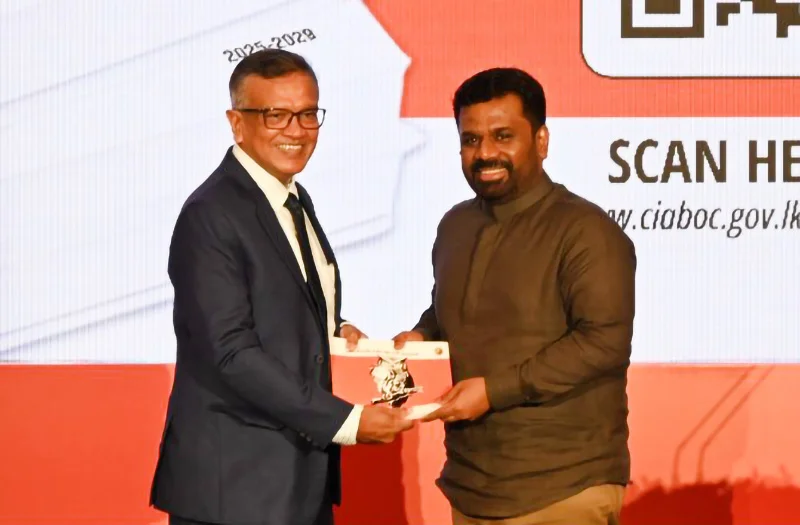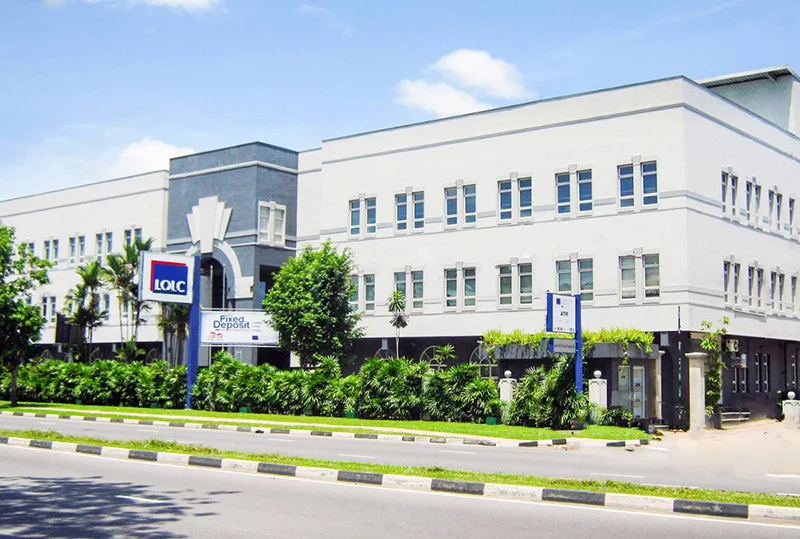Business
Unity, the key point in COYLE-led economic revival plan

By Hiran H.Senewiratne
Unity is the path to re-building Sri Lanka’s economy. This is the theme of a 10-point plan to ‘Restart Sri Lanka’ and overcome its multiple crises, put forward by the Chamber of Young Lankan Entrepreneurs (COYLE) and several other organizations, with a high presence in the local economy.
‘At this moment we have to build the country’s economy regardless of politics. Therefore, the whole country should support this endeavor. The way to build this economy is through unity and acceptance of each other and all stakeholders within Sri Lanka, COYLE chairman Dimuth Silva said at a media conference held at JAIC Hilton Residences on Wednesday to announce the plan. The 10-point plan will be presented to the President, the Opposition Leader, all political party leaders, the Mahanayake Theras of all Chapters, His Eminence the Cardinal and other religious leaders.
Silva said the first imperative is to establish political and administrative stability on an urgent basis and reduce the powers vested with the Executive President. “The plan also recommends appointing relevant professionals, as members of the Cabinet, and other key bodies, he said.
“The government must accept responsibility for allowing the crisis to exacerbate and the first step to finding solutions is acceptance, Mahanuwara Sinhala Welanda Peramuna Vice President Yasas Chandrasekera said.
He added that in 2019 many regional chambers cautioned the government against its move to amend the VAT threshold, remove NBT and other direct taxes, when it came to power.
Chandrasekera also said that the government could not foresee the trap it had dug itself, which had also set inflation soaring.
He said that the business community is ready and willing to pay taxes and that the government must come out with a well-thought-out structure and effective plan to implement taxes, given the current poor state of the economy and inflation.
Chandrasekera said that the country is going through a major shortage of essentials, which the present government should be responsible for.
He said that just to please big businessmen, the government brought tax relief which cost the country Rs 700 billion. Apart from that, the government also printed more than Rs 1.7 trillion, which pushed the economy to a very high inflation level, he explained.
‘The membership will resort to strong action and drive for solutions, if the leadership cannot take necessary action to effectively address the crisis. The membership raised issue with the government for not taking timely action despite several warnings and the public and local businesses are now left to face the bulk of issues, he added.
Lanka Confectionery Manufacturers Association chairman, S.M D Suriyakumara said that the confectionery industry is going through a major crisis because they are not in a position to import raw material due to the US dollar shortage.
” We almost came to the position to think of our continuity in the business due to high raw material prices. We were compelled to initiate abnormal price increases, Suriyakumara said at the press conference.
He added: ‘Other points include to immediately address the financial and essential goods crisis faced by the public and support for industries that bring foreign exchange into the country.
“We are facing a lot of difficulties obtaining raw materials and it is beginning to impact our continuity. The contribution from the sector to the government is far more than that which the state or any other stakeholders envisage and we have invested over Rs. 10 billion in the country over the past 10 years. Over 25 per cent of revenue in the small and medium retail sector comes from bakery and confectionery goods. We consist entirely of Sri Lankan entrepreneurs and today we are in a very dangerous situation.’
All Ceylon Bakery Owners Association representative, N.K Jayawardena said that at present 7000 bakeries operate throughout the country. Of them 2000 to 2500 bakeries have shut down permanently and existing bakeries run at 50 per cent capacity due to high production cost.
‘Since the raw material prices have increased by 300 per cent the industry is facing a risk, affecting 300,000 direct and indirect employees.’
The COYLE-led group also moots a ‘Sri Lanka First’ negotiating strategy during discussions to restructure the country’s long-term debt.
Reducing government expenditure and ensuring efficient and self-sufficient state entities was also a key point that was presented. Good governance through political reforms, enhancing industrialization through an accelerated export drive, redefining policies to empower both traditional and disruptive industries, a global campaign to promote foreign investment through Free Trade Agreements, effective communications and transparency among all stakeholders and capitalizing on the Port City, were among the 10 points listed by the group.
Joining the discussion, Tile and Sanitaryware Importers Association president Kamil Hussain said this situation is the result of bad leadership and deceitful politicians figuring in successive governments.
He said the industry employed over 100,000, but now close to 75 per cent have left the industry.
‘Many importers have taken their capital elsewhere and the construction industry has been deeply impacted. We urge the government to consider the proposals very seriously and give the private sector the opportunity to lend support to the government to help manage and overcome the difficulties it is faced with, he said.
The professional associations behind the ‘Restart Sri Lanka’ plan, besides COYLE include, the Chamber of Commerce and Industries of Yalpanam, United Trade and Industry Association – Dehiwala, Matara District Chamber of Commerce and Industry, Nugegoda Entrepreneurs and Professional Alliance, Minuwangoda Traders Association, Lanka Business Ring, Nawalapitiya Traders Association, Entrepreneurs Lanka, Mahanuwara Sinhala Welanda Peramuna, Kiribathgoda Sinhala Merchants Association, Galle District Chamber of Commerce and Industries, Event-Management Association Sri Lanka, Lanka Confectionary Manufacturers Association, Kurunegala Sinhala Welanda Peramuna, All Ceylon Bakery Owners Association, Association of Container Transport, Association of Clearing and Forwarding and the Federation of Chambers of Commerce and Industry of Sri Lanka.
Business
National Anti-Corruption Action Plan launched with focus on economic recovery

In a decisive move to stabilize Sri Lanka’s economy and rebuild investor confidence, the Commission to Investigate Allegations of Bribery and Corruption (CIABOC) yesterday launched the National Anti-Corruption Action Plan (NACAP) 2025–2029, with a clear focus on promoting transparency, accountability and economic governance.
Developed with the support of the United Nations Development Programme (UNDP) and funded by the government of Japan—contributing nearly USD 900,000—the initiative aims to address corruption as a critical economic barrier.
The launch, attended by President Anura Kumara Dissanayake, Chief Justice Murudu Fernando PC, and high-level diplomatic and institutional representatives, signals a shift in Sri Lanka’s economic reform narrative. The NACAP is seen not just as a governance tool but as an economic recovery strategy designed to attract foreign investment, improve public finance management and rebuild public trust.
R.S.A. Dissanayake, Director General of CIABOC, noted that corruption, “is more than a legal issue—it is an economic cancer that stifles innovation, distorts markets and deters foreign direct investment.” The establishment of Internal Affairs Units (IAUs) within government institutions is expected to bring internal oversight to public spending and performance, improving the efficiency of state services.
Japanese ambassador Akio Isomata stressed that eliminating corruption is essential for Sri Lanka to regain global investor confidence. “Transparency and good governance are fundamental pillars for sustainable economic development, he said. “For Sri Lanka to attract foreign investment and achieve long-term growth, the effective implementation of this Action Plan is crucial.”
Echoing this, UNDP Resident Representative Azusa Kubota highlighted the importance of aligning governance with economic goals. “The NACAP is a roadmap for transforming Sri Lanka’s economic governance, she said. “It will make corruption visible, measurable, and actionable.”
The NACAP is built on four strategic pillars—Preventive Measures, Institutional Strengthening & Enforcement, Education, and Law & Policy Reform—targeting nine priority areas. These include streamlining state enterprise management, modernizing financial crimes investigation and integrating anti-corruption education into economic policymaking.
The implementation timeline is designed with a phased approach: short-term stabilization, medium-term reform and long-term transformation—ensuring consistent progress toward a more accountable and economically resilient state.
“Corruption ends here. The responsibility of eradicating bribery and corruption will not be passed on to the next generation — it will be resolved by our government today, President Anura Kumara Dissanayake said.
The President stressed it marks a turning point in Sri Lanka’s history. “With the launch of the National Anti-Corruption Action Plan 2025–2029, we are drawing a bold line in the sand. No longer will the fight against corruption be tangled in politics or postponed for the future. Public officials now have six months to bring transparency and integrity to their institutions. After May, the law will act decisively and without exception. This is not just policy — it’s a promise. A new era of accountability has begun and it begins with us.”
By Ifham Nizam
Business
Verdant Capital doubles down: $13.5m now powering LOLC Africa’s MSME expansion

Verdant Capital invests $4.5M more in LOLC Africa, expanding MSME lending across 10 countries and deepening financial inclusion efforts continent-wide.
Verdant Capital has announced that its Verdant Capital Hybrid Fund (the “Fund”) has completed an additional investment of USD 4.5 million in LOLC Africa Singapore Limited (“LOLC Africa”). This investment brings the total investment in LOLC Africa to USD 13.5 million. This follows the initial investment of USD 9 million in LOLC Africa, completed in June 2023. Both investments are structured as holding company loans, and they are being directed towards LOLC Africa’s operating lending subsidiaries in Zambia, Rwanda, Egypt, Kenya, Tanzania, Nigeria, Malawi, Zimbabwe, Ghana, and the Democratic Republic of Congo.
Founded in 1980 in Sri Lanka, LOLC entered the African continent in 2018. Verdant Capital Hybrid Fund is the first external investor in LOLC Africa’s operations, reflecting the Fund’s catalytic investment approach. These investments are driving the expansion of LOLC Africa’s micro, small and medium enterprises (MSMEs) financing footprint across the continent. Additionally, the Fund’s Technical Assistance Facility (TAF), has offered financial support for LOLC Africa’s Social Ratings and Client Protection Pre-Certifications for its subsidiaries in Zambia and Egypt, with further Technical Assistance initiatives in the pipeline.
Business
HNBA’s advisor & partnership channels drive 26% growth

HNB Assurance PLC (HNBA) delivered another year of outstanding financial performance, securing a 7.5% market share and moving a step closer to achieving its ambitious target of 10% market share by 2026. This success was a result of the company’s well-structured strategies, focused on sustainable growth in an increasingly competitive landscape, which yielded impressive results, with its Gross Written Premium (GWP) growing by 26% compared to the previous year.
Over the past four years, HNBA has maintained an average growth rate of 26%, consistently outperforming the industry. A key element of HNBA’s approach has been prioritizing distinctive, value-driven products over high-volume, lower-margin offerings. This strategy has allowed the company to cater to a broader customer base, ensuring inclusivity while maintaining the competitiveness and relevance of its product portfolio
In terms of growth, HNBA’s proactive investment strategy resulted in an 8% growth in investment income, reaching Rs. 6.9 Bn, while Funds Under Management saw a 26% increase. HNBA paid net benefits and claims totaling Rs. 2.9 Bn. The total assets of the company expanded by 24% to Rs. 53.4 Bn, primarily driven by increased financial investments. Additionally, total Life Insurance contract liabilities grew by 25% to Rs. 38.6 Bn, following a surplus transfer of Rs. 1.3 Bn to shareholders.
-

 Business4 days ago
Business4 days agoColombo Coffee wins coveted management awards
-

 Business6 days ago
Business6 days agoDaraz Sri Lanka ushers in the New Year with 4.4 Avurudu Wasi Pro Max – Sri Lanka’s biggest online Avurudu sale
-

 Features5 days ago
Features5 days agoStarlink in the Global South
-

 Business7 days ago
Business7 days agoStrengthening SDG integration into provincial planning and development process
-

 Business6 days ago
Business6 days agoNew SL Sovereign Bonds win foreign investor confidence
-

 Features2 days ago
Features2 days agoSri Lanka’s Foreign Policy amid Geopolitical Transformations: 1990-2024 – Part III
-

 Features5 days ago
Features5 days agoModi’s Sri Lanka Sojourn
-

 Midweek Review2 days ago
Midweek Review2 days agoInequality is killing the Middle Class




















